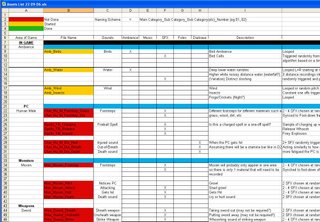Week 7
- Practical 1 - Audio Arts - Production and Component Assessment [1]

Download Asset list 22-09-06
This week we talked about Production and Implementation. I didn't seem to take many notes for some reason, so I can't really remember what we went through. For the second half of the lesson, Christian loaded up Starcraft on his Mac. We analysed the start-up cinematic, and a mission from in-game. Nothing new for me, maybe look at one of the other second year blogs for further details. All I can say is that Starcraft is a pretty basic game from an audio perspective compared to the latest games of today, so in this light, it's probably a good first game to start analysing without overwhelming the class with a more complex game. Like many of the previous weekly tasks for this subject, I found the terminology used to describe what we had to do a little confusing. In my search for game references to help me with my forest environment ambience, I loaded up and analysed "Fable" for the Xbox. I found it very interesting to play the game with an analytical hat on. The environment forest ambience of the game seemed very rich to me, but after some close listening, I noticed how it was cleverly put together.
Water:
- Constant running river sound
- One off (seemingly random) splashes
- Distant water sound and white noise (heard from a distance to give the area depth)
- Slight delays were applied to the water sounds to make the river sound bigger and more expansive.
Birds:
- Constant bird ambience
- individual bird sounds with different levels of reverb to simulate their distance from the PC. Also to give a sense of depth to the environment.
PC Footsteps:
- different sounding per material walked on
- Also higher pitched when running faster and lower pitched when running slower
Impressed with the audio for Fable, I have somewhat modelled my own audio on this game.
Here are some test examples of what I've done so far
Title Ambience - Download
Button Down SFX 1 - Download
Button Down SFX 2- Download
- Practical 2 - Creative Computing - HID [2]
- Music Technology Forum - Workshop - Improvisation Groups! [3]
With the aim of ‘unlearning’ his previous jazz education, for the last three years he has been developing his own personal improvisation style based on intuitive playing.
As part of his improvisation development he performs a daily ritual where he reads phrases from a book of teachings from the Dali Lama, and tries to draw intuitive inspiration from these readings.
He introduced the class to a number of different improvisation techniques that we might be able to make use of, and then demonstrated them by improvising with one of our improvisation groups.
For the first improvisation session, the audience was invited to participate. I used my voice and made some low and high sounds. It was a very liberating experience, and I’m glad I made the most out of the experience.
During the second jam, he used the techniques of 'for and against'. Derek himself played against Henry. I thought the jam sounded ok at the time, but once it finished, Derek gave some valuable feedback which subsequently seemed to make the remaining jams sound a lot better.
The next jam he used the technique of "me and my shadow", which was to follow what someone else is doing. This presented an interesting dimension of structure. I especially like the sound of Henry’s bass sliding as he tried to mimic Derek’s sax playing.
The final improvisation combined a number of different techniques, but also a number of different popular tunes. His reasoning for playing pop tunes in amongst the rest of the playing was to alert people and heighten their listening skills.
During the Q&A session at the end, I found it interesting that his idea of a successful jam was one that completely captures and involves the audience.
- References
- [1] Haines, Christian. 2006. Lecture on Game Audio. University of Adelaide, 5 September.
- [2] Haines, Christian. 2006. Lecture on SuperCollider. University of Adelaide, 7 September.
- [3] Pascoe, Derek. 2006. Presentation by Derek Pasco. University of Adelaide, 7 September.


0 Comments:
Post a Comment
<< Home